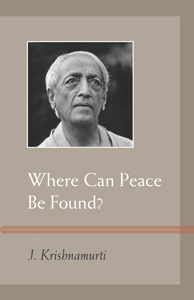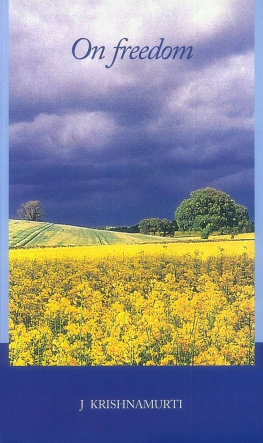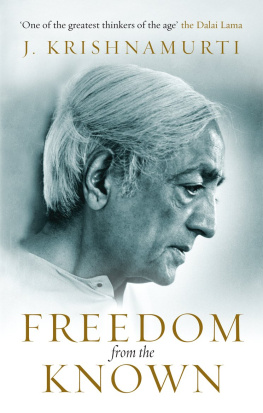Krishnamurti - Total Freedom: The Essential Krishnamurti
Here you can read online Krishnamurti - Total Freedom: The Essential Krishnamurti full text of the book (entire story) in english for free. Download pdf and epub, get meaning, cover and reviews about this ebook. publisher: HarperSanFrancisco, genre: Religion. Description of the work, (preface) as well as reviews are available. Best literature library LitArk.com created for fans of good reading and offers a wide selection of genres:
Romance novel
Science fiction
Adventure
Detective
Science
History
Home and family
Prose
Art
Politics
Computer
Non-fiction
Religion
Business
Children
Humor
Choose a favorite category and find really read worthwhile books. Enjoy immersion in the world of imagination, feel the emotions of the characters or learn something new for yourself, make an fascinating discovery.

- Book:Total Freedom: The Essential Krishnamurti
- Author:
- Publisher:HarperSanFrancisco
- Genre:
- Rating:4 / 5
- Favourites:Add to favourites
- Your mark:
- 80
- 1
- 2
- 3
- 4
- 5
Total Freedom: The Essential Krishnamurti: summary, description and annotation
We offer to read an annotation, description, summary or preface (depends on what the author of the book "Total Freedom: The Essential Krishnamurti" wrote himself). If you haven't found the necessary information about the book — write in the comments, we will try to find it.
Total Freedom: The Essential Krishnamurti — read online for free the complete book (whole text) full work
Below is the text of the book, divided by pages. System saving the place of the last page read, allows you to conveniently read the book "Total Freedom: The Essential Krishnamurti" online for free, without having to search again every time where you left off. Put a bookmark, and you can go to the page where you finished reading at any time.
Font size:
Interval:
Bookmark:
Total Freedom: The Essential Krishnamurti
Copyright 1996 by Krishnamurti Foundation of America
and Krishnamurti Foundation Trust, Ltd.
TOTAL FREEDOM
The Essential Krishnamurti
J. Krishnamurti
CONTENTS
FOREWORD
Great sages of history have been ill-served in the preservation of their wisdom. The best of these saints and savantsancient Hindu and Jewish holy men, the Buddha, Confucius, Socrates, Jesus Christ, the Prophet Mohammedleft few significant writings. Their truths were unfolded in profound discourses and sagacious dialoguesoral expositions transmitted to us in incomplete renderings. Thus, only some of the verities are known; many have been lost. Those who seek the complete scheme, as originally presented, have to depend on unreliable intermediaries such as faith, interpretation, interpolation, and reconstruction.
As we move closer to our time, this problem is inverted. Knowledge overtakes wisdom and culture surrenders to technology. Recordings are comprehensive, but what is recorded is often of lesser value. There is, it seems, a shortage of authentic sages. By the numbers there are plenty who purvey wisdom and pseudo-wisdom, teachers claiming to possess and provide transcendent insights. However, very few of them survive the tests that surely define a real spiritual pathfinderthe ability to convey a message that is universal and liberating, nondiscriminating and free of hatred; a message that is capable of disinterested enrichment of minds and lives, and is also within the understanding of everyone. By any or all of these yardsticks, J. Krishnamurti was truly a modern master.
Krishnamurtis entire life was focused on realizing and explaining the human quest. For six decades, until his death in 1986 at the age of ninety, he traveled the world bringing his thoughts to those who would listen. Millions did. His popularity sometimes fluctuated, but Krishnamurti persisted in his efforts to set man absolutely, unconditionally free. Toward the end of his life, new generationschildren of our technetronic agerediscovered Krishnamurti. In an era of hot shots and holy rollers, razzle-dazzle religion and pulpit rap, he retained the aura of an old-fashioned prophet. Philosophic fads came and went; Krishnamurti endured.
There are two reasons for this apparent timelessness. The most obvious is, of course, the personality of Krishnamurti. His public persona radiated a kind of undemonstrative charisma, the attraction of luminous restraint. Add to this a speaking manner and tone that could evoke a personal intimacy in the midst of even the largest audiences. It is not surprising that the writer Aldous Huxley, no slouch when it came to critical observation, declaimed: It was like listening to a discourse of the Buddhasuch power, such intrinsic authority.
Yet, in the end, personality alone is an unsatisfactory explanation. Many who did not see or hear Krishnamurti were and still are drawn to his thoughts. So, to appreciate the appeal we must go to the philosophic sourcethe ideas he articulated and their main themes. A careful examination of this body of work will reveal both consistency and changes. While certain central concepts remain fundamental, Krishnamurti did not hesitate to adapt and evolve to new historical circumstances and spiritual quests.
Again and again, Krishnamurti declared that people do not need guidance, they need awakening. This high confidence in human potential was rooted in the belief that each individual has no limit on development, if he can eschew the cultural barnacles that load his being: A theory based on another mans experience in matters of the psyche or of an inward life has no meaning at all.... We have to let it go completely because we have to stand alone. With this denial of the transferability of experience and the rejection of all spiritual guidance, including his own, Krishnamurti breaks with most world religionsall of which have spiritual paradigms and instructors whose examples we can emulate. It was not his purpose to attack other faiths, but he frequently warns against the misleading power of religions, institutions, and ritualsand above all, the divisiveness of sectarianism.
As the years passed, Krishnamurtis philosophic and intellectual membranes expanded beyond his core themes. Increasingly, we see him addressing the evils of civil and religious power, the futility of existing social structures, the inertia of conformity, and the failure of temporizing reform. By the mid-1950s, Krishnamurti had developed notions about education, human relations, and communications that are not found in his earlier discourses. The teacher was also learningnot only answering the questions of others but also extending his own questions. Yet, the range of his expositions grows to embrace a number of new concernsnationalism, war, ecological despoliation, unemployment, and hunger. With an almost contemporary sensitivity, social issues that were once on the periphery of his perceptions come closer to center stage. References to the significance of meditation become more frequent. A note of impatience, an urgency, begins to surface. Krishnamurti senses the peril of the times and the compelling demand for action. As if to respond in style as well as substance, his talks become more focused and his dialogues less elliptical. And yet, the essential message is unchanged: When one sees life as it is, when one sees oneself as one is, [only] from there can one move [ahead].
Of all the sages and significant spiritual figures of modern times, Krishnamurti has had the longest exposureabout sixty-five years on the stage of eminence. Yet, it is difficult to assess his historical stature. He is too close to us and it is too early to know the full effect of his teachings. After all, for several decades subsequent to his crucifixion, there was little sign that Jesus Christ would make a major mark on history. At the moment of their death and for quite some time after, who could have predicted the long-term influence of the Buddha, Confucius, or even Karl Marx? If Krishnamurtis ideas become more widely accepted in the future, it will be because they resonate with the yearnings of peoplebecause they speak intently to individuals disillusioned with all-knowing and socially transforming macroideologies. Should this outcome take place, it will be because Krishnamurtis discourses resonate across boundaries of time and place. His voice is silent but its message never ceases to speak.
Ralph Buultjens, Ph.D.
Professor of Social Sciences, New York University,
former Nehru Professor at Cambridge University, U.K.
PREFACE
From obscure beginnings in a small town in India, Krishnamurti emerged as an uncompromising and unclassifiable teacher, whose talks and writings were not linked to any specific religion and were neither of the East nor the West but for the whole world.
For some sixty years he spoke to vast audiences in words that were of vital, catalytic relevance to every individual and every society. He had frequent discussions with distinguished writers, philosophers, scientists, educators, and national leaders. With extraordinary immediacy and directness, and without any frameworks or dependencies, he was able to reach the core of problems with which humanity has grappled for centuries.
Krishnamurtis books have been published all over the world and translated into more than twenty languages. His works are also available on audio and video recordings and electronic disks. Much of this material is now used in over 150 colleges and universities.
Faced with this volume of material, we have chosen a broad range of previously published works as well as unpublished ones to give a sense of the depth and breadth of Krishnamurtis teaching. Readers are, of course, encouraged to look beyond this selection to the whole body of his talks and writings.
Next pageFont size:
Interval:
Bookmark:
Similar books «Total Freedom: The Essential Krishnamurti»
Look at similar books to Total Freedom: The Essential Krishnamurti. We have selected literature similar in name and meaning in the hope of providing readers with more options to find new, interesting, not yet read works.
Discussion, reviews of the book Total Freedom: The Essential Krishnamurti and just readers' own opinions. Leave your comments, write what you think about the work, its meaning or the main characters. Specify what exactly you liked and what you didn't like, and why you think so.









